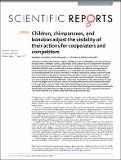Children, chimpanzees, and bonobos adjust the visibility of their actions for cooperators and competitors
Date
17/08/2017Metadata
Show full item recordAbstract
Chimpanzees and bonobos are highly capable of tracking other's mental states. It has been proposed, however, that in contrast to humans, chimpanzees are only able to do this in competitive interactions but this has rarely been directly tested. Here, pairs of chimpanzees or bonobos (Study 1) and 4-year-old children (Study 2) were presented with two almost identical tasks differing only regarding the social context. In the cooperation condition, players' interests were matched: they had to make corresponding choices to be mutually rewarded. To facilitate coordination, subjects should thus make their actions visible to their partner whose view was partially occluded. In the competition condition, players' interests were directly opposed: the partner tried to match the subject's choice but subjects were only rewarded if they chose differently, so that they benefited from hiding their actions. The apes successfully adapted their decisions to the social context and their performance was markedly better in the cooperation condition. Children also distinguished between the two contexts, but somewhat surprisingly, performed better in the competitive condition. These findings demonstrate experimentally that chimpanzees and bonobos can take into account what others can see in cooperative interactions. Their social-cognitive skills are thus more flexible than previously assumed.
Citation
Grueneisen , S , Duguid , S , Saur , H & Tomasello , M 2017 , ' Children, chimpanzees, and bonobos adjust the visibility of their actions for cooperators and competitors ' , Scientific Reports , vol. 7 , 8504 . https://doi.org/10.1038/s41598-017-08435-7
Publication
Scientific Reports
Status
Peer reviewed
ISSN
2045-2322Type
Journal article
Collections
Items in the St Andrews Research Repository are protected by copyright, with all rights reserved, unless otherwise indicated.

